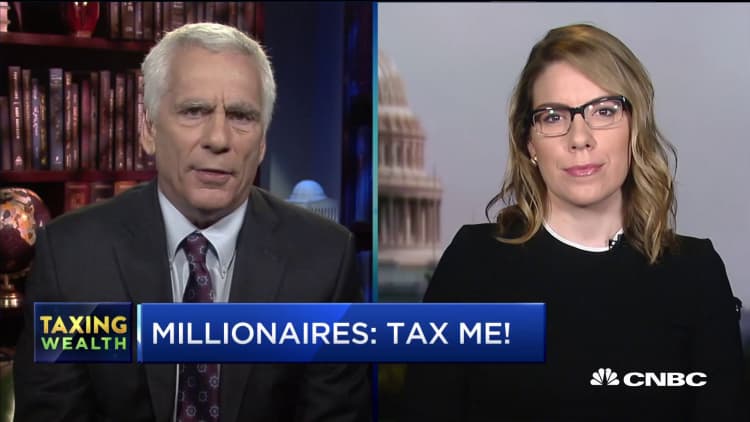The Internal Revenue Service and the Treasury Department have issued final rules blocking certain states' attempts to work around the new $10,000 cap for state and local tax deductions.
After the Tax Cuts and Jobs Act in 2017 imposed a $10,000 limit on state and local tax deductions that itemizers could claim on their federal return, New York, New Jersey and Connecticut responded with a workaround.
Those states passed legislation that would allow municipalities to create charitable funds to pay for local services and offer property tax credits to incentivize homeowners to give.
In turn, those taxpayers could then write off the payment as a charitable deduction on their federal income tax return.
The IRS and Treasury barred this move in their final rule, saying that receipt of a state or local tax credit in return for making such a contribution would constitute a "quid pro quo."
The net effect is to reduce the federal deduction a taxpayer can claim for the charitable contribution.
For instance, if you received an 85% state tax credit for making your donation, you would only be able to claim 15% of your contribution on your federal tax return.
The new rule also has a chilling effect on pre-existing plans in other states, where residents have received tax credits for donating to school voucher programs.
More from Personal Finance:
What you should know about new IRS tax withholding form
'Jeopardy!' winner likely owes $1.2 million in taxes
This tax strategy for massive IRAs is on its way out
There are more than 100 existing state charitable tax-credit plans in 33 states, a research paper authored by a group of tax law professors found.
These programs range from conservation easements to private school tuition scholarships.
"The private school organizations were asking for full-scale carveouts for themselves; they wanted to be exempt if the program was designed to benefit private entities instead of public ones," said Carl Davis, research director at the Institute on Taxation and Economic Policy.
"The IRS stuck to its guns with a broad regulation that treats donations to all these entities the same way," he said.
Slowing donations
For example, the Alabama Opportunity Scholarship Fund offers a total of $30 million in state tax credits each year.
Individuals may donate the equivalent of up to 50% of their state income tax liability, up to $50,000.
Alabamans get back a dollar-for-dollar tax credit on their state return.
Ambiguity around the federal tax treatment of these donations has led to a slowdown in giving since the 2019 funding cycle started on Jan. 1, according to Lesley Searcy, executive director of the Alabama Opportunity Scholarship Fund.
Taxpayers who give to the Exceptional SC program in South Carolina, a scholarship fund for children with exceptional needs, have also been hesitant this year, said Chad Connelly, executive director of that program.
South Carolinians who give to the program can claim a dollar-for-dollar credit on their state income tax , up to 60 percent of their tax liability for that year.
Whether the final rule will ultimately deter people from donating to these funds remains to be seen.
"If you're really passionate about private school vouchers in Georgia, you donate and you still get 100% of your donation back," said Davis. "You just won't get a federal tax deduction on top of it."
A fight with the IRS
The IRS and Treasury proposed this rule last year, giving it an effective date of Aug. 27, 2018.
If you made a contribution to a state fund after that date and then claimed it on your 2018 federal tax return as a charitable donation, you're risking a showdown with the IRS, said Daniel Rosen, partner in the North America Tax Practice Group at Baker & McKenzie.
"If the final regulations are issued with the retroactive date of Aug. 27, 2018, you'll have to report on your return that you're taking a position that's inconsistent with the regulation," he said.
"You've bought yourself a fight," Rosen said.
Certainly losing a federal benefit is significant to anyone looking to make a contribution to a state charitable fund.Daniel Rosenpartner at Baker & McKenzie
Though some commenters asked Treasury and the IRS to push back the effective date to 2019 or 2020, the agencies stuck with the original Aug. 27, 2018 date.
"If the proposed applicability date had not been contemporaneous with the proposed regulations, the Treasury Department and the IRS believe that taxpayers would have engaged in significant tax planning in advance of the regulations being finalized, resulting in a significant loss of revenue," the agencies said in the final regulation.

Donors who want to continue giving to these funds will need to consider the extent to which the federal tax break matters to them.
"Certainly losing a federal benefit is a significant calculus to anyone looking to make a contribution to a state charitable fund," said Rosen.
"But if you're not motivated by the desire to get a deduction at the federal level, then your decision-making shouldn't be affected by pending regulatory action," he said.


